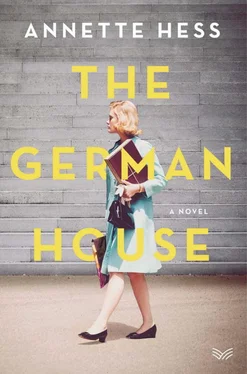Eva mopped the floor of the cavernous German House dining room. Her father, who had since risen from his beauty sleep, was in the kitchen polishing surfaces with the radio on. A Schlager pop song Eva and Jürgen had once danced to carried into the dining room. Peter Alexander crooned, “Come with me to Italy!” Jürgen was a good dancer. And he smelled so good, like resin and the sea. He held her so tight when they danced. He always knew what was right and what was wrong. Eva swallowed. She pushed him away in her mind, furious and disappointed. Jürgen, who for half a year had called from his desk every morning at eleven, hadn’t been in touch today. Eva slapped the wet mop on the floorboards. She resolved never to see him again if he didn’t call by two. As for his letters, the white gold bracelet, deerskin gloves, angora undergarments (she’d had pneumonia in November, and Jürgen had been very concerned), collection of Hesse poems, and… boom boom boom! Someone was thumping on the locked front door. Eva spun around: a man, a young man. Jürgen, overcome by emotion, had uncharacteristically abandoned his desk to ask for her hand in marriage, right here, right now. On bended knee. Eva set aside the mop, hastily shed her smock, and rushed to the door. Everything was fine. But then she recognized the unfriendly man from yesterday through the glass. David Miller. Annoyed, she opened the door. “We’re closed!” David shrugged and looked at her, unfazed. “I’m here on behalf of…” Eva was astonished to notice that David hadn’t left any tracks in the fresh snow, as though he’d flown up to the door. Strange.
“The lead prosecutor sent me.”
Eva hesitantly waved him inside. David entered. They stood at the bar, while in the kitchen, an Italian tenor sang his heart out. Eva could have joined in. “Seven days a week, I want to spend with you.”
“The interpreter can’t enter the country, at least not yet. He was deemed politically unreliable, and he’s got to get his affairs in order. So we need a replacement. Trial begins Friday.”
Eva was stunned. “You mean to say I should translate?”
“I’m not the one saying it. They just sent me.”
“Oh, my. And for how long? A week?”
David studied Eva almost pityingly. He had pale blue eyes, and his left pupil was larger than the right. Perhaps it had to do with the light, perhaps it was something he’d been born with. It gave him an unsteady, permanently searching expression. And he’ll never find himself , Eva thought instinctively, although without a sense of why.
“Have you already spoken with my agency? With my boss, Herr Körting?”
But David appeared not to have heard the question. He recoiled, as though Eva had struck him, and leaned against the bar.
“Are you unwell?”
“I forgot to eat breakfast. It’ll pass in just a minute.”
David caught his breath. Eva stepped behind the bar and filled a glass of water from the tap. She handed it to him, and he took a sip. As he drank, his gaze traveled to the opposite wall, which was densely hung with autographed black-and-white portraits. There were men and women, mostly local celebrities, he assumed—actors, soccer players, or politicians who had eaten at German House. They smiled at David and showed him their best side. He didn’t recognize a single one of them. He straightened and placed the half-empty glass on the bar.
“Call this number.” David handed Eva a business card with the name of the attorney general, an address, and a telephone number. “And if you take the job, you’d better start learning the necessary vocabulary.”
“What do you mean? Military terms?”
“Every conceivable word for how to kill a person.”
David turned abruptly and left the restaurant. Eva slowly closed the door behind him.
Her father had come out of the kitchen in his white coat and dark trousers, chef’s hat on his head, a red checkered dish towel slung over his shoulder. He looks like a clown about to get a cannonload of spaghetti and tomato sauce blown in his face , Eva mused.
“Who was that? What did he want? Perhaps another suitor, daughter dearest?” Ludwig winked, then got to his knees before the bar and with the dish towel, began polishing the tin facing at its base, which was there to protect the wood from being kicked. Eva shook her head impatiently. “Daddy, can you think of nothing else? It was about a job. As an interpreter in court.”
“Sounds major.”
“It’s a trial against SS officers who worked in that camp.”
“And what camp would that be?”
“Auschwitz.”
Her father kept polishing the facing, as though he hadn’t heard her. Eva studied the back of his head for a moment, where his hair was thinning. Every eight weeks, she trimmed her father’s hair in the kitchen. He couldn’t sit still for long and fidgeted like a little boy. It was always a tedious process, but Ludwig refused to go to a barber. Eva had a deep aversion to the hairdresser’s, herself. She had a childlike fear that getting her hair cut there might hurt. Annegret called Eva’s fear “nervous nonsense.” Eva reached for the mop, dunked it in the bucket, and wrung it out with her hands. The water had gone lukewarm.
Later that evening, her parents sat in the living room. Ludwig to the left, on his shabby end of the sofa, Edith in her little yellow armchair, whose velvet upholstery had once glowed gold. Purzel was rolled up in his basket. He yipped occasionally as he dreamed. The Tagesschau was on television, and small images appeared onscreen as the anchor presented the news stories. As usual, Ludwig provided commentary for each segment. Edith had pulled out some sewing. She was mending a tear in Stefan’s orange mitten—apparently Purzel had gotten hold of it again. The anchor was reporting on West Germany’s largest dike construction project. After only four months’ time, the final section of the three-kilometer-long protective dike on the Rüstersiel mudflats had been completed. The footage showed a great deal of sand.
“Rüstersiel,” Ludwig said, with a bit of homesickness in his voice. “Do you remember the time we were there and ate fresh plaice?”
Edith didn’t look up, but answered, “Mmh.”
“In an art gallery in Detroit, a fire has destroyed thirty-five paintings by the Spanish artist Pablo Picasso. The damage amounts to approximately two million Deutschmarks,” the anchor read. A Cubist painting appeared behind him, but on the small black-and-white screen, it had no impact.
“That’s almost sixty thousand marks per picture! God only knows why these pictures are all worth so much.”
“You wouldn’t understand, Ludwig,” Edith replied.
“All the better.”
“Federal Minister of the Interior Hermann Höcherl has ordered the transfer of former SS Hauptsturmführer Erich Wenger from the Federal Office for the Protection of the Constitution to the Federal Office of Administration in Cologne.” The wall behind the anchor remained gray. Viewers did not get to see what Erich Wenger looked like. Eva’s parents were silent. They breathed in time with one another. The weather forecast followed, showing a map of Germany covered in white crystals. It would continue to snow.
“She should hurry up and marry that Schoormann fellow,” Ludwig said, putting on his thickest Low German dialect.
Edith hesitated. But then she responded, “Yes. It would be for the best.”
In the Schoormanns’ mansion, Jürgen sat at dinner with his father and his second wife. Like every evening, they didn’t sit down to eat until half past eight, a by-product of working in the mail-order industry. Jürgen had worked well into the evening with his staff on the new catalog. Now he watched his father, who sat across from him at the table, warily dissect his bread and cheese. His father was deteriorating noticeably. He’d always been bulky but was now turning into a shrunken little man. Like a grape becomes a raisin when left in the sun , Jürgen thought. Brigitte sat close to his father, stroked his cheek, and placed a slice of cheese back on the bread.
Читать дальше
Конец ознакомительного отрывка
Купить книгу












